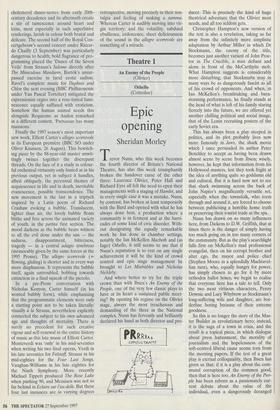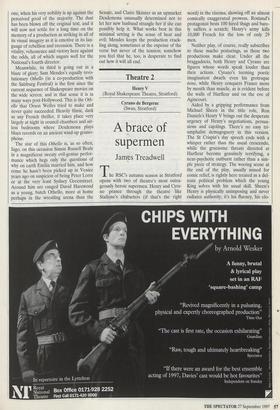Theatre 1
An Enemy of the People (Olivier) Othello (Cottesloe)
Epic opening
Sheridan Morley
Trevor Nunn, who this week becomes the fourth director of Britain's National Theatre, has also this week triumphantly broken the handover curse of the other three: Laurence Olivier, Peter Hall and Richard Eyre all felt the need to open their managements with a staging of Hamlet, and in every single case it was a mistake. Nunn, by contrast, has broken at least temporarily with the Bard and opened with what he has always done best, a production where a community is in ferment and at the barri- cades of some kind of civic disorder. With- out denigrating the equally remarkable work he has done in chamber settings, notably the Ian McKellen Macbeth and (as Iago) Othello, it still seems to me that if Nunn's reputation is to rest on any single achievement it will be the kind of crowd control and epic stage management he brought to Les MisErables and Nicholas Nickleby.
And where better to try for the triple crown than with Ibsen's An Enemy of the People, one of the very few classic plays to have at its heart a sustained public meet- ing? By opening his regime on the Olivier stage, always the most treacherous and demanding of the three in the National complex, Nunn has fervently and brilliantly declared his hand as both director and pro- ducer. This is precisely the kind of huge theatrical adventure that the Olivier most needs, and all too seldom gets.
Christopher Hampton's new version of the text is also a revelation, taking us far away from the infinitely more simplistic adaptation by Arthur Miller in which Dr Stockmann, the enemy of the title, becomes just another variant of John Proc- tor in The Crucible, a man defiant and alone in front of the McCarthyite mob. What Hampton suggests is considerably more disturbing; that Stocicmarin may in many ways be as dangerously fascist as all of his crowd of opponents. And when, in Ian McKellen's breathtaking and barn- storming performance, he finally stands at the head of what is left of his family staring fiercely into the future, we are offered yet another chilling political and social image, that of the Lenin recruiting posters of the early Soviet era.
This has always been a play steeped in politics, and its plot probably lives now more famously in Jaws, the shark movie which I once persuaded its author Peter Benchley to accept as having been drawn almost scene by scene from Ibsen; wisely, however, he kept that information from his Hollywood masters, lest they took fright at the idea of anything quite so goddamn old and cultural. But it is hard now not to see that shark swimming across the back of John Napier's magnificently versatile set, especially when the townsfolk, who teem through and around it, are forced to choose between publicising a horrible home truth or preserving their tourist trade at the spa.
Nunn has drawn on so many influences here, from Dickens to D.W. Griffith, that at times there is the danger of simply having too much going on in too many corners of the community. But as the play's searchlight falls first on McKellen's mad professional evangelist, then on his corrupt brother and alter ego, the mayor and police chief (Stephen Moore in a splendidly Machiavel- lian turn), who, equally hungry for power, has simply chosen to go for it by more orthodox ballot boxes, we begin to realise that everyone here has a tale to tell. Only the two most virtuous characters, Penny Downie and Lucy Whybrow as Stockmann's long-suffering wife and daughter, are bor- derline boring because of their extreme goodness.
So this is no longer the story of the Mas- ter Builder as revolutionary hero; instead, it is the saga of a town in crisis, and the result is a topical piece, in which dialogue about press harassment, the morality of journalism and the hopelessness of the soft-centred liberal cause seems torn from the morning papers. If the test of a great play is eternal colloquiality, then Ibsen has given us that; if it is a play about the com- munal corruption of the common good, then that is here too. An Enemy of the Peo- ple has been reborn as a passionately cur- rent debate about the value of the individual, even a dangerously deranged one, when his very nobility is up against the perceived good of the majority. The dust has been blown off the original text, and it will now not settle for a long time on the memory of a production as striking in all of its visual imagery as it is emotive in its lan- guage of rebellion and recession. There is a vitality, vehemence and victory here against the odds, all of which augurs well for the National's fourth director.
Meanwhile, its third is going out in a blaze of glory; Sam Mendes's equally revo- lutionary Othello (in a co-production with the Salzburg Festival) is the first since the current sequence of Shakespeare movies on the wide screen, and in that sense it is in many ways post-Hollywood. This is the Oth- ello that Orson Welles tried to make and never quite succeeded. Heavily filmic, dark as any French thriller, it takes place very largely at night in council chambers and air- less bedrooms where Desdemona plays blues records on an ancient wind-up gramo- phone. The star of this Othello is, as so often, Iago, on this occasion Simon Russell Beale in a magnificent sweaty evil-genius perfor- mance which begs only the questions of why on earth Emilia married him, and how come he hasn't been picked up in Venice years ago on suspicion of being Peter Lorre or at the very least Sydney Greenstreet. Around him are ranged David Harewood as a young, butch Othello, more at home perhaps in the wrestling arena than the Senate, and Claire Skinner as an upmarket Desdemona unusually determined not to let her new husband strangle her if she can possibly help it. What works best in this minimal setting is the sense of heat and evil; Mendes keeps the production crack- ling along, sometimes at the expense of the verse but never of the tension; somehow you feel that he, too, is desperate to find out how it will all end.











































































 Previous page
Previous page